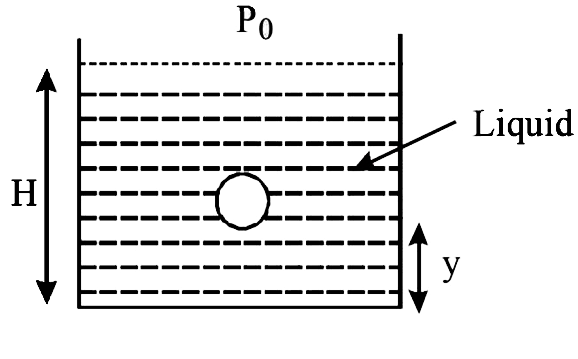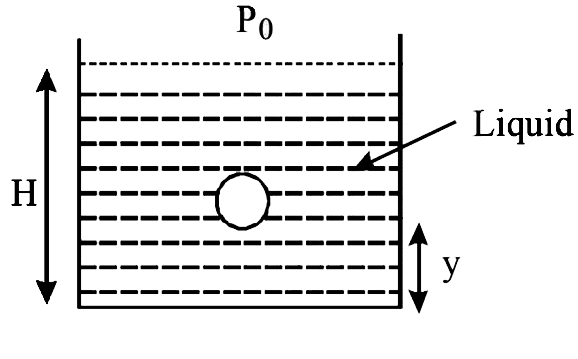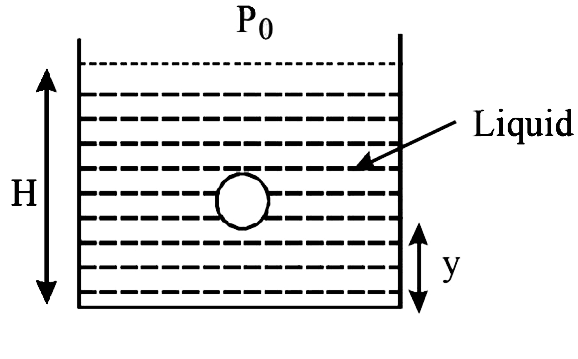A small spherical monoatomic ideal gas bubble (γ=5/3) is trapped inside a liquid of density ρ (see figure). Assume that the bubble does not exchange any heat with the liquid. The bubble contains n moles of gas. The temperature of the gas when the bubble is at the bottom is T0, the height of the liquid is H and the atmospheric pressure P0 (Neglect surface tension).

When the gas bubble is at a height y from the bottom, its temperature is-
T0(P0+ρlgHP0+ρlgy)2/5
T0(P0+ρlg(H−y)P0+ρlgH)2/5
T0(P0+ρlgHP0+ρlgy)3/5
T0(P0+ρlg(H−y)P0+ρlgH)3/5
The correct Answer is:B
(b) It is given that the bubble does not exchange any heat
with the liquid. This means that while the bubble moves
up and expand, the process is adiabatic.
For adiabatic expansion the pressure -temperature
relationship is
T2=T1[P1P2]1−γγ
Here T1=T0,P−1=P0+Hρlg,
P2=P0+(H−y)ρlg,γ=53
∴T2=T0[P0+HρlgP0+(H−y)ρlg]1−53/5/3
T0[P0+HρlgP0+(H−y)ρlg]−23×35
T_2=T_0[(P_0+(H-y)rho_lg)/(P_0+Hrho_lg)]^(2/5)
Topper's Solved these Questions
Similar Questions
Two spherical bubbles of radii 3 cm and 4cm coalesce to form another spherical bubble. Calculate the surface tension of the bubble. The radius of the bubble formed=4.498 cm and the atmopheric pressure =105 Pa
View SolutionWhen a large bubble rises from the bottom of a lake to the surface, its radius doubles. The atmospheric pressure is equal to that of a column of water of height H. The depth of the lake is
View Solution
Knowledge Check
A small spherical monoatomic ideal gas bubble (γ=53) is trapped inside a liquid of density ρl (see figure) . Assume that the bubble does not exchange any heat with the liquid. The bubble contains n moles of gas. The temperature of the gas when the bubble is at the bottom is T0, the height of the liquid is H and the atmospheric pressure is P0 (Neglect surface tension).
_E01_434_Q01.png)
When the gas bubble is at a height y from the bottom , its temperature is :-AT0(P0+ρlgHP0+ρlgy)2/5BT0(P0+ρlg(H−y)P0+ρlgH)2/5CT0(P0+ρlgHP0+ρlgy)3/5DT0(P0+ρlg(H−y)P0+ρlgH)3/5A small spherical monoatomic ideal gas bubble (γ=5/3) is trapped inside a liquid of density ρ (see figure). Assume that the bubble does not exchange any heat with the liquid. The bubble contains n moles of gas. The temperature of the gas when the bubble is at the bottom is T0, the height of the liquid is H and the atmospheric pressure P0 (Neglect surface tension).

The buyoncy force acting on the gas bubble is (Assume R is the universal gas constant)AρlnRgT0(P0+ρlgH)2/5[P0+ρlgy]7/5BρlnRgT0(P0+ρlgH)2/5[P0ρlg(H−y)]3/5CρlnRgT0(P0+ρlgH)3/5[P0+ρlgy]8/5DρlnRgT0(P0+ρlgH)3/5[P0ρlg(H−y)]2/5A small spherical monoatomic ideal gas bubble (γ=5/3) is trapped inside a liquid of density ρ (see figure). Assume that the bubble does not exchange any heat with the liquid. The bubble contains n moles of gas. The temperature of the gas when the bubble is at the bottom is T0, the height of the liquid is H and the atmospheric pressure P0 (Neglect surface tension).

As the bubble moves upwards, besides the buyoncy force the following forces are acting on itAOnly the force of gravityBThe force due to gravity and the force due to the pressure of the liquidCThe force due to gravity, the force due to the pressure of the liquid and the force due to viscocity of the liquidDThe force due to gravity and the force due to viscocity of the liquid
When a large bubble rises from the bottom of a lake to the surface, its radius doubles. The atmospheric pressure is equal to that of a column of water of height H. The depth of the lake is
View SolutionA colloidal system in which gas bubbles are dispersed in a liquid is known as
View SolutionWhen a large bubble rises from the bottom of a lake to the surface its radius doubles. If atmospheric pressure is equal to that of column of water height H then the depth of lake is
View SolutionThe gas inside a spherical bubble expands uniformly and slowly so that its radius increases from R to 2R. Let the atmospheric pressure be p0 and surface tension be S. The work done by the gas in the process is
View SolutionAn air bubble of radius r in water is at a depth h below the water surface at some instant. If P is atmospheric pressure, d and T are density and surface tension of water respectivley . the pressure inside the bubble will be :
View Solution
